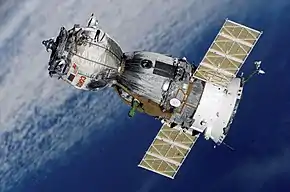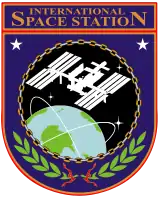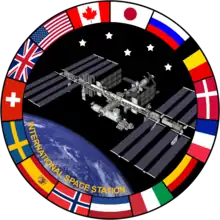Soyuz TMA-17
Soyuz TMA-17 was a human spaceflight mission to the International Space Station (ISS). TMA-17 crew members participated in ISS Expedition 22 and Expedition 23. The mission ended when the Soyuz TMA-17 capsule landed on 2 June 2010.
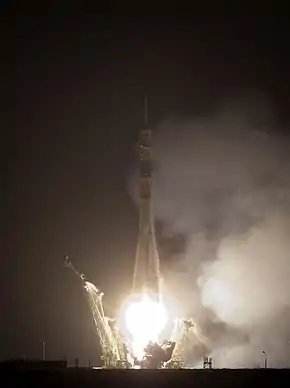 Launch of TMA-17 | |
| Mission type | Crewed mission to ISS |
|---|---|
| Operator | Roscosmos |
| COSPAR ID | 2009-074A |
| SATCAT no. | 36129 |
| Mission duration | 164 days |
| Spacecraft properties | |
| Spacecraft type | Soyuz-TMA 11F732 |
| Manufacturer | RKK Energia |
| Crew | |
| Crew size | 3 |
| Members | Oleg Kotov Timothy Creamer Soichi Noguchi |
| Callsign | Pulsar [1] |
| Start of mission | |
| Launch date | 20 December 2009, 21:52 UTC [2] |
| Rocket | Soyuz-FG |
| Launch site | Baikonur, site 1/5 |
| End of mission | |
| Landing date | 2 June 2010, 03:25 UTC |
| Landing site | Steppes of Kazakhstan |
| Orbital parameters | |
| Reference system | Geocentric orbit |
| Regime | Low Earth orbit |
| Inclination | 51.66° |
| Docking with ISS | |
| Docking port | Zarya nadir |
| Docking date | 22 December 2009, 22:48 UTC |
| Undocking date | 12 May 2010, 13:26 UTC |
| Time docked | 140 days, 14 hours and 38 minutes |
| Docking with ISS (Relocation) | |
| Docking port | Zvezda |
| Docking date | 12 May 2010, 13:53 UTC |
| Undocking date | 2 June 2010, 00:04 UTC |
| Time docked | 20 days, 10 hours and 11 minutes |
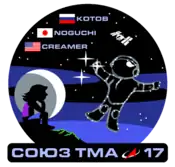 Soyuz TMA-17 mission patch  From left to right: Creamer, Kotov and Noguchi Soyuz programme (Crewed missions) | |
Crew
| Position[3] | Crew Member | |
|---|---|---|
| Commander | Expedition 22 Second spaceflight | |
| Flight Engineer 1 | Expedition 22 Only spaceflight | |
| Flight Engineer 2 | Expedition 22 Second spaceflight | |
Crew notes
Noguchi is the first Japan Aerospace Exploration Agency (JAXA) astronaut and the second Japanese astronaut to fly on a Soyuz, after Toyohiro Akiyama.
Backup crew
| Position | Crew Member | |
|---|---|---|
| Commander | ||
| Flight Engineer 1 | ||
| Flight Engineer 2 | ||
Launch and docking
Soyuz TMA-17 was launched on 20 December 2009 and transported three members of the ISS Expedition 22 crew to the station. Soyuz TMA-17 is the 104th flight of a Soyuz spacecraft. The Soyuz will most likely remain on board the space station for the remainder of the Expedition 22 increment to serve as an emergency escape vehicle.
This mission marked the first Soyuz launch in the month of December for a plus of 19 years. The prior Soyuz launch in the month of December was Soyuz TM-11 on 2 December 1990.
This mission also included the last planned docking of a Soyuz at the nadir, or Earth-facing, port of the Zarya module. The Rassvet module was attached to Zarya's nadir port during the STS-132 mission.[4]
Relocation
On 12 May 2010, the Soyuz TMA-17 spacecraft was relocated to the aft port of the Zvezda module.[5] At 14:23 UTC, Kotov, Creamer and Noguchi temporarily undocked the spacecraft from the nadir port of Zarya and flew it to the aft port of the Zvezda service module. The docking occurred at 14:53 UTC. After hooks and latches were engaged, the crew conducted leak checks, opened hatches around 17:40 UTC and then re-entered the station through the service module.[6]
Undocking and landing


On 26 May 2010, the orbital altitude of the International Space Station (ISS) was lowered by 1.5 kilometers to 345 kilometers to ensure perfect conditions for the re-entry of the Soyuz TMA-17 into the Earth's atmosphere. The orbit of the ISS was adjusted using the four engines on board the Progress M-05M spacecraft.[7]
Expedition 23 commander Oleg Kotov was at the controls of the Soyuz TMA-17 spacecraft as it undocked at 00:04 UTC on 2 June 2010 from the space station's Zvezda module. The Soyuz TMA-17 crew capsule landed on the steppes of Kazakhstan at 03:25 UTC on 2 June 2010 wrapping up their stay aboard the space station.[8]
References
| Wikimedia Commons has media related to Soyuz TMA-17. |
- "Soyuz TMA-17: Redocking Plan (Mission from FGB Nadir Port to Zvezda Instrumentation Compartment)". Russian Federal Space Agency. 12 May 2010. Retrieved 12 May 2010.
- Yembrick, John; Byerly, Josh (20 December 2009). "Crew Lifts Off From Kazakhstan to Begin Science and Construction Work Aboard the International Space Station" (Press release). NASA. Archived from the original on 20 December 2009. Retrieved 20 December 2009.
 This article incorporates text from this source, which is in the public domain.
This article incorporates text from this source, which is in the public domain. - NASA Assigns Space Station Crews, Updates Expedition Numbering - NASA press release - 08-306 - November 21, 2008
 This article incorporates text from this source, which is in the public domain.
This article incorporates text from this source, which is in the public domain. - Stephen Clark (17 December 2009). "Russian storage module arrives in Florida for launch". Spaceflight Now.
- "ISS On-Orbit Status 05/12/10". NASA. 12 May 2010. Retrieved 12 May 2010.
 This article incorporates text from this source, which is in the public domain.
This article incorporates text from this source, which is in the public domain. - Justin Ray (12 May 2010). "Station crew clears the path for space shuttle mission". Spaceflight Now. Retrieved 13 May 2010.
- "ISS orbit lowered prior to Soyuz landing - Russian Space Agency". RIA Novosti. 26 May 2010. Retrieved 2 June 2010.
- William Harwood (2 June 2010). "Soyuz brings international crew back to Earth". Spaceflight Now. Retrieved 2 June 2010.
External links
- Image of tower retraction.
